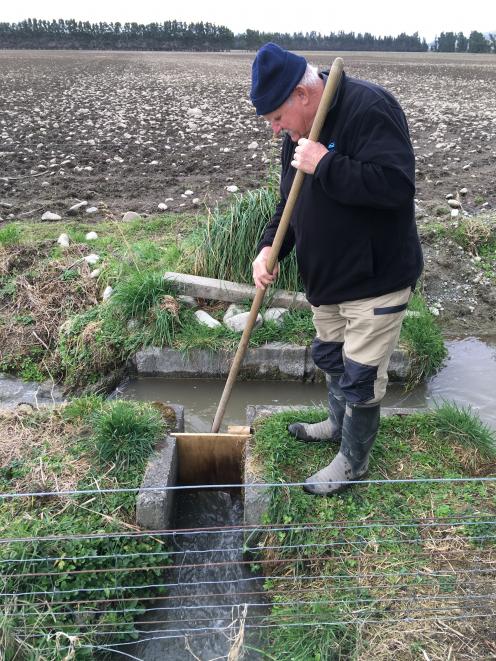
But his water career dates back to when he started with the Ashburton Lyndhurst Irrigation scheme in the 1970s.
By the time he retires from council at the end of this month - after 26 years as water ranger - he will have been involved in the building of Mid Canterbury's open irrigation system and the closure of some of it.
''I started with the Ashburton Lyndhurst scheme (between 1970 and 1989) and worked with the guys who built it, and now I'm seeing the guys pulling it apart,'' he said.

The rangers control excess surface water caused by rain using the district's water race network. In the past, this water was caught by the open irrigation races.
But as irrigation has steadily changed from the open system to enclosed pipe - a more efficient system - that excess water has to go somewhere else.
When heavy rain is forecast, the rangers shut down the system to let rainwater fill the void.
And then it is all on to keep the race flowing, clearing blockages; keeping water in the race and off the road network.
''We are overcautious rather than under cautious, cause we can get caught out.
''We've got to think two or three days ahead as to whether we need to shut water off or not.
''Sometimes it's [the forecast] right, sometimes it's wrong, but it takes four or five days to get (the race) right again.''
Once the bulk of rainfall water has flowed through, the water is turned back on to ensure a steady flow of 15 litres per second to the farms network it feeds.
There is not much Mr O'Donnell does not know about the race system he controls.
Long hours, long days, phone calls at all times of the day and night. And in the early days, few weekends off
- it was more a lifestyle than a job.
His ute is his office. He has travelled just over 55,642km in 12 months.
On an average day he drives 200km to 300km a day, zig-zagging across the district to cover his patch, and he might talk to just five or six people: other rangers, and farmers in his area seeking advice or sorting issues.
He is the last of the ''old originals'' who have worked all corners of the district's race network.
Most recently he has worked the central Mid Canterbury area, maintaining the race network around Winchmore, Mt Somers and Willowby.
At 69, Mr O'Donnell's ready for retirement, but he will miss the job and the people.
''I will miss the actual farmer contact and getting out of bed to go to work,'' he said.
''Every day is a different day.''
Once he retires, the job will fall to the two remaining full-time water rangers, Dean McDougall and Dave Jones, who will split the district into north and south, with help from two part-time rangers.
It is unlikely Mr O'Donnell will rest for long. He plans to keep himself entertained, whether it is a few hours a week working - he has all the licences except a bus licence - volunteering, or spending time at The Plains Museum or the Ashburton MenzShed.
But for now, Mr O'Donnell and wife Sheral plan to spend time catching up with family and at their caravan at Waikuku, North Canterbury, where the whitebait and fish are calling.













